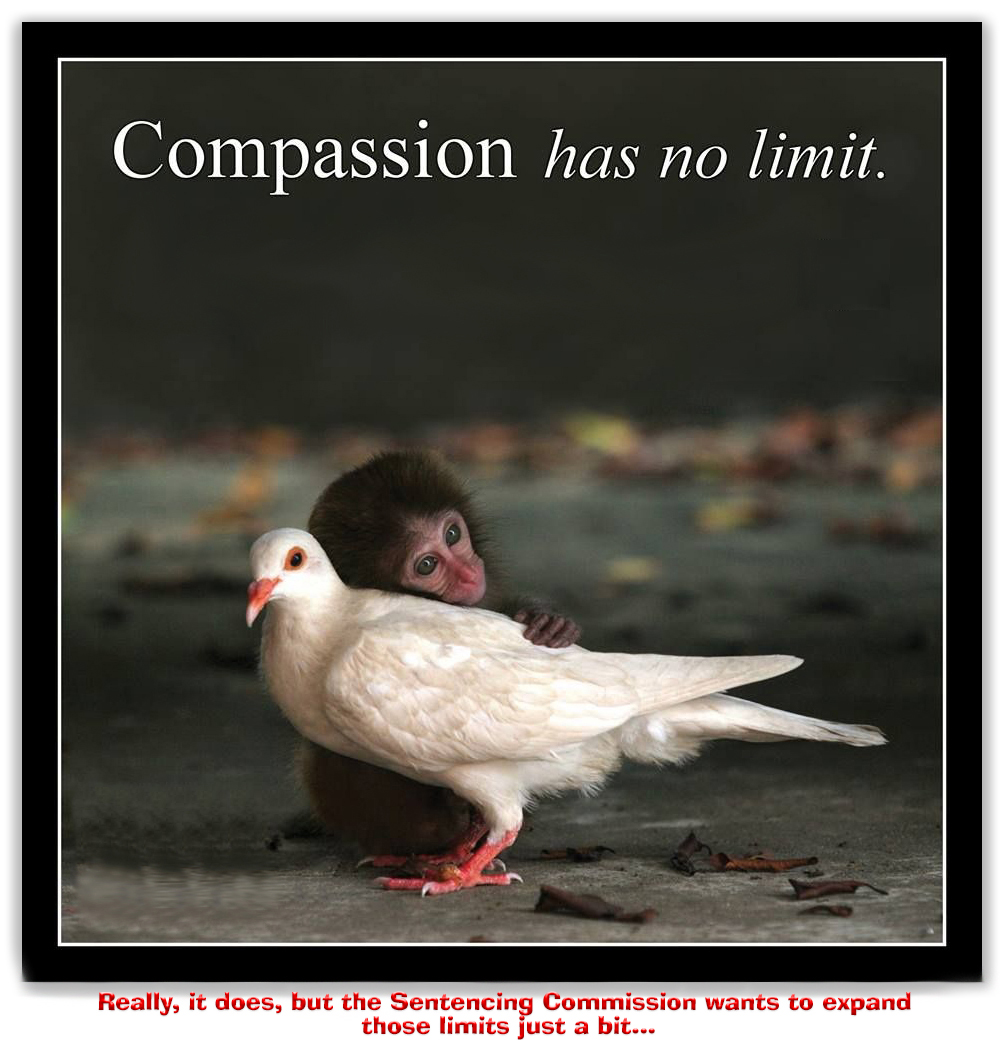We post news and comment on federal criminal justice issues, focused primarily on trial and post-conviction matters, legislative initiatives, and sentencing issues.

SENTENCING COMMISSION ISSUES DRAFT COMPASSIONATE RELEASE AMENDMENTS
 For the first time in five years, the U.S. Sentencing Commission last week issued draft Guidelines amendments that – after public comment and a 6-month Congressional review period – will become effective in November.
For the first time in five years, the U.S. Sentencing Commission last week issued draft Guidelines amendments that – after public comment and a 6-month Congressional review period – will become effective in November.
The USSC’s draft amendments cover everything from the drug safety valve to extra points off for defendants with a zero criminal history score to tougher guideline numbers for gun straw purchasers. But these draft changes are of lesser interest to prisoners because nothing the Commission changes in the guidelines is retroactive unless the USSC goes through a separate amendment process to make it so.
The last time that happened was the “drug-minus-two” change in 2014. Whether any of the sentencing changes the USSC issued in draft form last week will ever make the retroactivity cut is not yet clear.
The compassionate release policy statement that the USSC rolled out, however, will have applicability for people already serving a sentence. The Guidelines applied at sentencing have been advisory for the past 18 years, but the Commission’s compassionate release policy, USSG § 1B1.13, is not: under 18 USC § 3582(c)(1)(A) – the “compassionate release” provision of the sentencing statute – a district court must ensure any sentence reduction decision “is consistent with applicable policy statements issued by the Sentencing Commission.”
 The existing compassionate release policy was written before the First Step Act passed, for an era in which only the Bureau of Prisons could bring a compassionate release motion on behalf of an inmate. Since First Step passed, most (but not all) circuit courts have ruled that § 1B1.13 is not binding because it had not been amended to include First Step changes. While that freed district courts to grant compassionate release in circumstances other than the few listed in the old § 1B1.13, it wasn’t all good.
The existing compassionate release policy was written before the First Step Act passed, for an era in which only the Bureau of Prisons could bring a compassionate release motion on behalf of an inmate. Since First Step passed, most (but not all) circuit courts have ruled that § 1B1.13 is not binding because it had not been amended to include First Step changes. While that freed district courts to grant compassionate release in circumstances other than the few listed in the old § 1B1.13, it wasn’t all good.
“Commission data have indicated that in recent years — over the COVID-19 pandemic and without a Commission quorum — the district courts have granted compassionate release at varying rates,” US District Court Judge Carlton W. Reeves, Commission chairman, said at last week’s USSC meeting. “It is my sincere hope that our work… brings greater clarity to the federal courts and more uniform application of compassionate release across the country.”
According to the USSC, people in Oregon had a 62% chance of getting a compassionate release grant. People in the Middle District of Georgia had a 1.5% chance. Giving federal judges the freedom to define for themselves what justifies a sentence reduction is a great thing when it frees the jurists from unreasonably strict limitations. It’s not so great when defendants with similar histories and offenses are treated dramatically differently due to an accident of geography.
The draft § 1B1.13 amendments propose additions to circumstances justifying compassionate release that include “medical conditions that require long-term or specialized medical care, without which the defendant is at risk of serious deterioration in health or death, that are not being provided in a timely or adequate manner; risk of being affected by a disease outbreak in prison for which the defendant is at increased risk of suffering severe medical complications or death; the incapacitation of the defendant’s parent when the defendant would be the only available caregiver; the defendant has been the victim of sexual assault or physical committed by a BOP employee or contractor; or “the defendant is serving a sentence that is inequitable in light of changes in the law.”
 The proposal also suggests a “catch-all” provision that “the defendant presents an extraordinary and compelling reason other than, or in combination with” the other circumstances the Commission has proposed for the beefed-up § 1B1.13.
The proposal also suggests a “catch-all” provision that “the defendant presents an extraordinary and compelling reason other than, or in combination with” the other circumstances the Commission has proposed for the beefed-up § 1B1.13.
The USSC draft proposals also include a provision to amend § 1B1.3 the “relevant conduct’ provision that tends to run up sentencing ranges, “to add a new subsection (c) providing that acquitted conduct shall not be considered relevant conduct for purposes of determining the guideline range unless the conduct was admitted by the defendant during a guilty plea colloquy or was found by the trier of fact beyond a reasonable doubt to establish, in whole or in part, the instant offense of conviction.” As noted, no one at this point knows whether this might become retroactive in the future.
Reuters, U.S. panel proposes limiting sentencing of defendants for acquitted conduct (January 12, 2023)
USSC, US Sentencing Commission Seeks Comment on Proposed Revisions to Compassionate Release, Increase in Firearms Penalties (January 12, 2023)
USSC, Proposed Amendments to the Sentencing Guidelines (Preliminary) (January 12, 2023)
Sentencing Law and Policy, US Sentencing Commissions publishes proposed guideline amendments and issues for comment (January 12, 2023)
– Thomas L. Root

